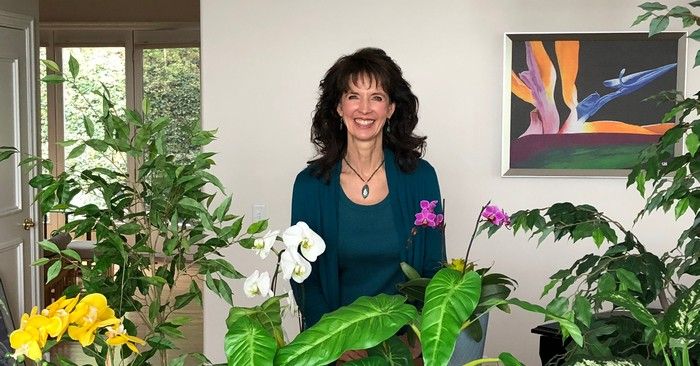
“That only happens to other people.” How often have you thought these words? I thought these exact words many times before my daughter, Heather, was born with multiple, visible disabilities in 1977. I was 21 years old. After that life-changing event, I started thinking, “Anything can happen to me just as much as anyone else.” Something else did happen to me. In 2009, I was diagnosed with having Multiple Sclerosis, MS.
What Were My Symptoms Before MS Diagnosis?
People often ask me the question, “How and when were you diagnosed with MS?” They also asked me, “What symptoms were you having before your diagnosis?” Here is the story of my MS diagnosis.
The previous twelve years before my MS diagnosis in 2009, I had experienced partial numbness; first in the tips of my toes, then the balls of my feet. Later the numbness moved to the arch of my foot and then my heel. The numbness progressed to my ankle. Also, I experienced heaviness in my legs, especially when climbing stairs, rocks, and steep inclines during hiking.
Walking in the snow and in the deep sand felt much harder than it ever had before. This scared me because I really loved being active, which included hiking with my husband, Lynn, and teaching aerobics.
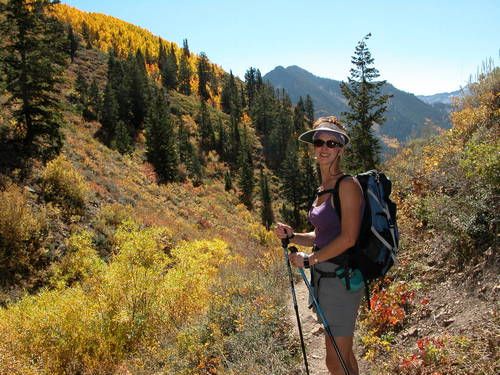
Sometimes, while watching a movie with Lynn on Friday nights after a long, active week, I would rub my toes, feet, and calves. Without saying anything to Lynn, I would wonder, “What if these symptoms are a bad disease like Multiple Sclerosis?”
I had a friend, who I watched deteriorate with MS through the course of a few years. He changed from being a healthy, young man in his thirties to riding in an electrical wheelchair, driving a hand operated van, and living life as a man with severe disabilities. He had a heart attack in his forties while showering, bringing him to an early death. The silver lining for him was that he didn’t have to move home and be dependent on his parents. He really didn’t want to do that.
Multiple sclerosis was the only condition I knew anything about, which is why I wondered about MS when I thought about my symptoms.
When Did MS Symptoms Begin?
Around the year 1998, I kept feeling like my socks were bunched up under my toes. I took off my shoes to check, only to find my socks smooth. After a while, I realized that numbness on the underside of my toes was the mystery feeling.
I consulted with a neurologist at the University of Utah Medical Center, the U, in 2000. He said, “I don’t know what’s causing your symptoms. I don’t know if it will get worse, or if it will go away. Sometimes we don’t find the answers to these kinds of problems.” I accepted this professional opinion and went on with my life, learning to live with the symptoms.
The numbness began to creep into the ball of my foot.”Strange,” I thought.
When I wore flip flops I could no longer keep them on my feet. At that time, I didn’t give it much thought. I attended a friends wedding, wearing slip-on shoes. I couldn’t keep them on my feet, either.
MS Misdiagnosed, Two Times
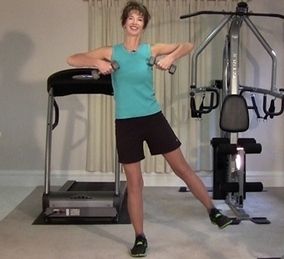 In 2005, approximately seven years later, I consulted with another neurologist because the numbness had increased, and I was always cold. This time, I went to a doctor at the St Marks Hospital. After he tested my nerves and muscles and diagnosed my condition, he said, “It’s tarsal tunnel. It’s like carpal tunnel in the hands, but in the feet.”
In 2005, approximately seven years later, I consulted with another neurologist because the numbness had increased, and I was always cold. This time, I went to a doctor at the St Marks Hospital. After he tested my nerves and muscles and diagnosed my condition, he said, “It’s tarsal tunnel. It’s like carpal tunnel in the hands, but in the feet.”
The neurologist also said I had a circulation disorder that caused my coldness, especially my hands and feet. He added, “The great news is, you don’t have carpel tunnel from cutting hair for so many years.” That was great news. By then, I had been a hairstylist for thirty years.
The diagnosis made sense to me because I was on my feet so much from doing hair, teaching aerobics, and hiking.
To cover all my bases, I consulted with a back doctor, for the second time, to find out if the three bulging discs in my lower back could be causing the numbness. “No, it would be one foot, not both,” he assured me. I went away saying, “Okay, tarsal tunnel and circulation problem. No big deal.”
When Did MS Symptoms Get Worse?
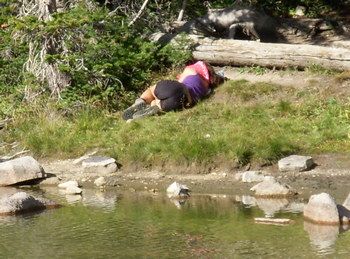 During 2007 and 2008, my legs got much weaker and seemed heavier, especially when hiking steep elevations and when hiking long periods of time without stopping to rest. I had to wait for the burning and weakness in my legs to subside.
During 2007 and 2008, my legs got much weaker and seemed heavier, especially when hiking steep elevations and when hiking long periods of time without stopping to rest. I had to wait for the burning and weakness in my legs to subside.
I would get so tired from exerting so much energy when hiking that sometimes I fell asleep on the ground when Lynn and I arrived at our destination, which was usually a lake or a peak.
When I arrived home, I felt like I’d just run a marathon. Feeling completely exhausted and fatigued, I concluded that it must be old age.
I know, we don’t like to say the words, “old age.” When my body was aching and tired, sometimes I looked at 70 and 80-year-old people and thought, “Oh my gosh, what must their bodies feel like?”
After returning from vacationing in Hawaii in 2009, I was compelled to seek answers. I wouldn’t stop until I had them.
Tests for MS Diagnosis
Four months later, I went to my appointment with a neurologist, whom I had previously met when consulting him about my son, Logan’s, health. I described my symptoms and asked many questions.
The doctor ordered a few tests. The test results would rule out some possible diseases. He drew a sample of my blood and said he would look for more information. He said, “If the blood work doesn’t show results, I will order a brain MRI to rule out other diseases.” I asked, “Do you mean diseases like MS?” “Yes,” he answered.
My blood work was normal. The doctor said, “You can have a brain MRI if you want, but I don’t think we’ll find anything.” Committed to finding answers, I said, “Yes, I want the brain MRI.”
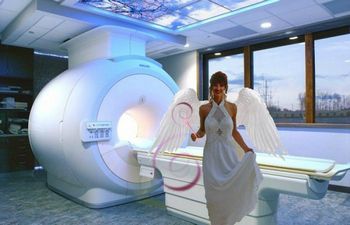 I was really scared to get an MRI. The machine was huge. Seeing it reminded me that something terrible could be wrong with my body. I felt so small and helpless. I didn’t like feeling like that. “I’ve got to think more positive thoughts,” I said to myself.
I was really scared to get an MRI. The machine was huge. Seeing it reminded me that something terrible could be wrong with my body. I felt so small and helpless. I didn’t like feeling like that. “I’ve got to think more positive thoughts,” I said to myself.
I pictured myself as an angel, having divine powers to heal my body. Suddenly, I didn’t feel so small. I asked all my loved ones in the spirit world, “Please surround me, focus on healing my body, and fill me with hope and love.” As I laid on the cold, metal table, inside the long tube of the MRI machine, my mind was filled with these positive visions of healing.
At the same time, I was completely surrounded by scary, loud sounds that sounded like jack-hammers, along with beeping, buzzing, and grinding, as the MRI machine scanned my brain and spine. A very long two hours later, I was finished.
Afterward, I had to wait for the results. The doctor said, “I’ll call you on Friday and give you the results of your MRI.” All this happened in August of 2009.
A Doctor’s Call Diagnosed My MS
The week dragged on. I didn’t like waiting for answers. Friday finally came. That afternoon, I was cutting a customer’s hair. She was a nurse. I told her I was waiting for a call from the doctor to give me the results of my MRI.
That Friday I was cutting a customer’s hair. She was a nurse. I told her I was waiting for a call from the doctor to give me the results. The loud ring of the phone made us both jump. I answered the phone, while I was standing behind my customer. Both of us were facing the mirror. “Hello?”
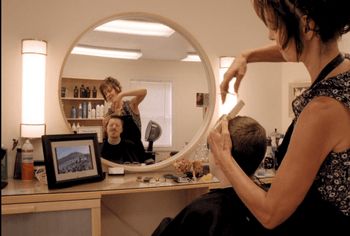 “This is the doctor. I looked at your brain MRI results. I ate my words when I saw your MRI. Your suspicions are correct.” Looking in the mirror, my eyes met my customer’s eyes. I furrowed my eyebrows and showed her a look of shock and fear. I asked, “MS?” The doctor said, “Yes.”
“This is the doctor. I looked at your brain MRI results. I ate my words when I saw your MRI. Your suspicions are correct.” Looking in the mirror, my eyes met my customer’s eyes. I furrowed my eyebrows and showed her a look of shock and fear. I asked, “MS?” The doctor said, “Yes.”
My emotions went on automatic pilot and my robotic personality took over. I scheduled an appointment to meet him in his office the following Thursday, for a spinal tap. This is another test to confirm MS. I would take my husband with me.
After hanging up the phone, my customer and I cried together. I pulled myself together and finished her hair. I also did my next customer’s hair and discussed with him what was happening.
Sharing My MS Diagnosis Helped Me Feel Supported
During past challenges, I’ve found that sharing my challenges helps me, so I don’t feel so alone when dealing with them. Talking helps me face the truth and move towards acceptance.
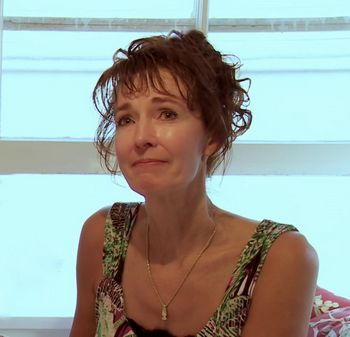 When I finished my work for the day, my feelings came rushing in. I felt disbelief, fear, and sadness all at once. Instead of driving home to grill steak, as I told my husband I would do that night, I called a restaurant and ordered dinner for two. I didn’t want to tell Lynn the news until after dinner.
When I finished my work for the day, my feelings came rushing in. I felt disbelief, fear, and sadness all at once. Instead of driving home to grill steak, as I told my husband I would do that night, I called a restaurant and ordered dinner for two. I didn’t want to tell Lynn the news until after dinner.
Trying to act completely normal, I greeted Lynn when he arrived home a few minutes after me. I told him that I picked up dinner. Confused, he said, “I thought you were grilling steak tonight.” Still working on acting normally I said, “Oh, I decided to pick up something.” “Why?” he asked. I answered, “I have my reasons. I’ll tell you after dinner.” He asked, “If you have reasons, why don’t you just tell me right now?”
I covered my face with both hands and burst into sobs. He rushed to me and asked, “What happened?” I suggested we go into the living room and sit down, so I could tell him. “The doctor called and told me the results of my brain MRI. I have MS.” I said. Lynn was speechless. So was I.
We hugged and cried for what seemed like a long time.
Denial About My MS Diagnosis
 “Wait,” I said. The doctor said, ‘Your suspicions are correct.'” My denial had set in. At that moment, his statement meant that MS is only a suspicion.
“Wait,” I said. The doctor said, ‘Your suspicions are correct.'” My denial had set in. At that moment, his statement meant that MS is only a suspicion.
Through my denial, I created a new perception, “I might not have MS.” Having this perception calmed some of my fears because it gave me hope. I hoped that after the doctor performed more tests, he would say, “You don’t have MS, afterall.”
My tears stopped. The fear and sadness were replaced with this new hope. Lynn and I ate our dinner and then watched an action movie that took us into another world.
Saturday morning, I awoke feeling like we needed to take a good hike to take our mind off all this serious stuff. I suggested hiking my favorite trail, Reynolds Peak in Big Cottonwood Canyon near my home. It’s a 3000 vertical foot climb to the peak. Lynn quickly agreed.
The hike took me a long time and it was getting late in the day, so I stopped at the saddle, just below the peak. We didn’t want to hike down in the dark. I felt so much better. Hiking was a good idea. It was therapeutic for both of us.
Decisions About Sharing My MS Tests
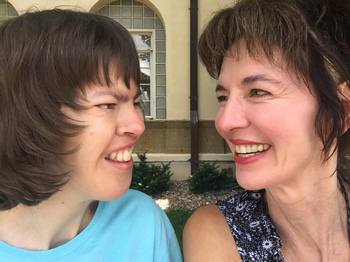 Because I was in denial, I didn’t want to tell anyone what I was going through. Telling people would make everything feel too real. I wasn’t ready to face this reality yet. I didn’t know when I would tell my family, or anyone else.
Because I was in denial, I didn’t want to tell anyone what I was going through. Telling people would make everything feel too real. I wasn’t ready to face this reality yet. I didn’t know when I would tell my family, or anyone else.
The doctor was going to do a spinal tap to test my spinal fluid. I learned that when a person has MS, T-cells, which are part of the immune system, show up in the spinal fluid. They weren’t supposed to be in there. I thought, “I’ll wait until after I find out these results before I tell anyone.”
The next day was Sunday. I was feeling heavy with the burden of my new challenge. The weight was too heavy for me to bear alone. Because I had hope, it made it easier to tell someone else.
I called Heather and said, “Hi Heather, I would like to come over and talk with you. Would that be okay with you?” She answered, “Sure, mom.”
When I arrived, we sat down to talk. Heather sat in front of me in her glider. She was very calm and fully present. She was prepared to listen to whatever I had to say. “I had an MRI. The results show that I have Multiple Sclerosis.” There, I said it.
Sharing MS Diagnosis with Someone Experiencing Disabilities
Without saying a word, Heather looked deep into my eyes. She had a full understanding of how I was feeling. Her eyes communicated complete acceptance of everything happening to me. She knew all too well that life is full of unexpected challenges. She’s lived a lifetime with disabilities, full of unexpected experiences, surrounding her physical and emotional health.
At that moment, she saw me as a person, who was facing a personal challenge with my own body. She knew from her experiences that, in time, I would gain acceptance. She also knew that before accepting my new reality, I would go through stages of denial, sadness, anger, and magical thinking, which are all normal processes when someone experiences loss.
Heather said, “You’re going to be OK, mom, no matter what the outcome is. You feel shocked, scared, sad, and angry now, of course, but later, you’ll find acceptance. You’ll have the strength to do whatever you need to do to get through your challenges and to make them better.”
Heather’s confidence that I would be OK, calmed my fears. As I drove away from her apartment, I already felt better. I felt more optimistic because I had shared what I was facing with her. I felt less isolated. Heather was a wonderful listener.
Although I was still in denial, my perception was, “I may not really have MS.” This gave me hope. Having hope, I felt empowered to take action that would help me feel like I was back in control of my life.
Changing My Perception Helped Me Through MS Diagnosis
“What can I do about all this?” I asked myself. My answer came quickly, “Turn it over to your higher power.” During difficult challenges in the past, I chose to seek support from a power greater than myself. This way, I was doing something to help myself.
When I was in my late 20’s, after Heather and Logan’s dad had deserted us, I had lost all my belief in God. I had developed the eating disorder, bulimia. I was truly powerless over it.
 After going to Overeaters Anonymous, doing the 12 step program, and memorizing the serenity prayer, “God, grant me the serenity to accept the things I can not change, the courage to change the things I can and the wisdom to know the difference. ” I gained a new belief in a power greater than myself, who could, and would, help me anytime I needed help. By asking for help from all the sources I could think of, I overcame bulimia. That was over 30 years ago.
After going to Overeaters Anonymous, doing the 12 step program, and memorizing the serenity prayer, “God, grant me the serenity to accept the things I can not change, the courage to change the things I can and the wisdom to know the difference. ” I gained a new belief in a power greater than myself, who could, and would, help me anytime I needed help. By asking for help from all the sources I could think of, I overcame bulimia. That was over 30 years ago.
Drawing on the strength that I’d developed from overcoming past challenges, I was driving alone in my car and yelled out loud, “I’m turning this over to you, higher power, universal energy, God.” And I did.
My body relaxed when I released my fears. I knew I was no longer alone. The unseen power that I believe exists, would guide me to what I needed to do next.
I used my denial and my perception that I may not have MS to tell other family members and friends what I was going through. I was going to create as much positive energy as I possibly could, by asking for their help.
Ask for Help During MS Diagnosis
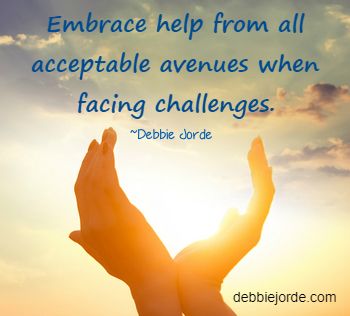 I contacted everyone in my family, all my friends, and all my customers by connecting in person, through email, texting, and phone messages. I said, “Please, concentrate, meditate, pray, or use whatever method works for you that I remain healthy and disease free. Please, help me create a miracle. I don’t want to have MS.”
I contacted everyone in my family, all my friends, and all my customers by connecting in person, through email, texting, and phone messages. I said, “Please, concentrate, meditate, pray, or use whatever method works for you that I remain healthy and disease free. Please, help me create a miracle. I don’t want to have MS.”
Even though I didn’t know if making miracles happen was really possible, asking people for help gave me something positive to focus on. It was an action I could do. I felt empowered, instead of helpless, and this made me feel better, instantly.
As I was driving to work the next day, I spoke out loud to the universe. I said, “I know I don’t want MS! I know there are many lessons I can learn from having MS, but I’m very clear, I don’t want to learn those lessons. I’ve learned enough lessons in one lifetime!”
I didn’t know if believing in miracles could make them happen. However, I believed that I must make my intentions clear to my higher power if I wanted to create the possibility of intervention.
My customers are of many different religions. I wanted encouragement, blessings, and prayers from all of them. I asked two of my friends, who are Mormon, to give me a blessing. If I had known of people in other religions that also gave blessings, I would have asked them, too. Taking actions to create positive energy helped me stay optimistic.
Final MS Diagnosis
The final results of all my tests were normal, except for my brain MRI and a few of the tests the doctor did in his office regarding sensitivity to cold, feeling vibrations, and strength. The MRI confirmed MS, so the doctor’s final diagnosis was MS My next steps were to learn more about MS, and start the treatment the doctor had recommended, which was to give myself a daily injection. I was scared, but I focused on doing what I could do, instead of the fear.
Help Everyday MS Symptoms
 I had been living with MS symptoms for so many years that my day to day activities felt the same. I felt like nothing had really changed, except, now I knew what was causing my symptoms.
I had been living with MS symptoms for so many years that my day to day activities felt the same. I felt like nothing had really changed, except, now I knew what was causing my symptoms.
Having MS means I need to take time out every day to take care of myself, otherwise I get stronger symptoms. When I get too tired, I feel weak and cranky. Without regular rests during the day, my legs are heavy and it takes more effort to climb stairs or hike steep trails, especially if I do it too fast. This makes me sad. I like being strong and active. It helps me a lot when I focus on what I can do, instead of what I can’t do. This makes me feel better.
Communication is very important to my emotional well-being. I talk with my husband about my feelings and encourage him to talk to me about his. We cry together, feel fear together, and hope and laugh together. I also talk with my daughter and son, Heather and Logan. Because both of them have lived with multiple disabilities all their lives, they are great support for me. I take this challenge one day at a time, like the other challenges I’ve faced and continue to face.
My Current Actions to Improve MS Symptoms
Currently, I’m doing everything possible help manage MS symptoms. Scheduling more transition time between all activities helps me regulate my energy. I give myself a daily injection of a drug named Copaxone. I’ve read that Copaxone is called “a miracle cure.” Knowing this, helps me to be optimistic, hopeful, and positive. I focus on how healthy I am today and avoid thinking about possible challenges that MS may bring in the future.
In 2012, three years after my diagnosis, I made this short video highlighting the steps I take to balance my life and keep MS symptoms at a minimum. My goal is to help other people who have MS, by sharing what helps me.
By focusing on what is real today and not what might happen in the future, whether it concerns my children, Lynn, my family members, or myself, I stay more conscious and positive. This keeps me emotionally available to experience the positive things happening now.
I appreciate the ability I have to feel joy because I’ve learned that accepting my challenges makes them easier. I will continue riding this roller-coaster called life laughing and crying, and living from my joy all the way.
FOLLOW MY MS JOURNEY TO HEALING
If you would like to follow my journey through overcoming MS, please subscribe below to receive updates. Today is January 2019, which marks ten years since doctors diagnosed me with MS.
I’ll be writing stories that detail the steps I’ve taken to heal my MS symptoms, improve my energy, and maintain my positive outlook. I’ll also share tips on how to prepare for an MRI. I’ve had ten of them now; one every year since my diagnosis. Also, I’ll share my experience of getting a spinal tap, so that if you ever have to get one, or know someone who needs one, you’ll know more.
I’ll continue to share other insights, as well, which can help you move through, and overcome challenges that you face in your life.
If you want to find more information about Multiple Sclerosis, the National MS Society is a good place to look. Click on the link below:

